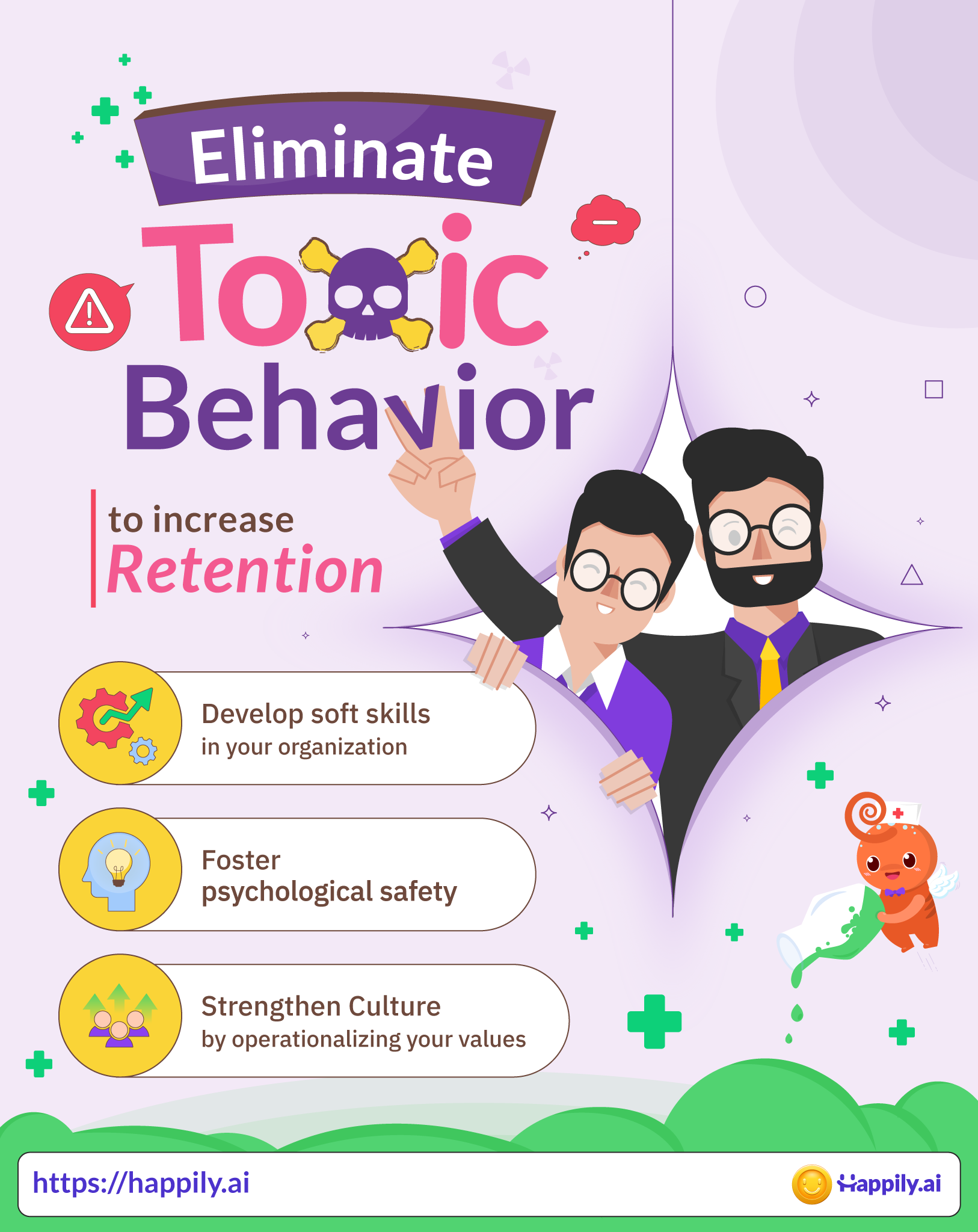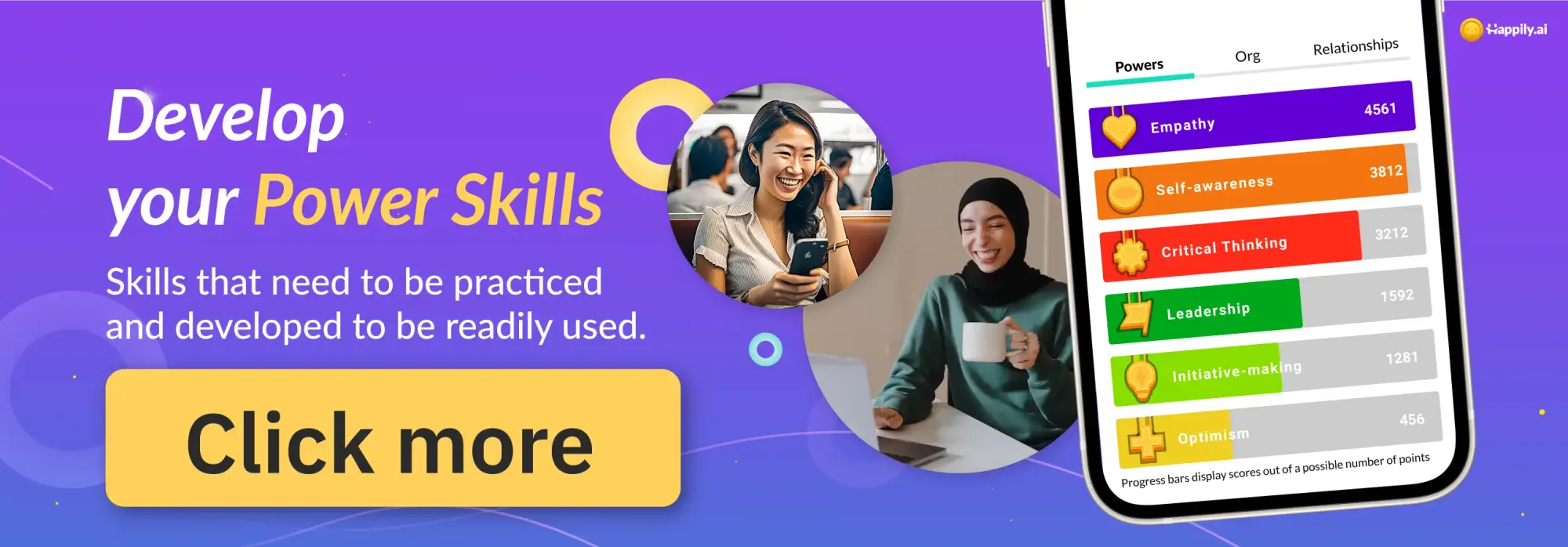According to MIT Sloan, employees are 10 times more likely to quit their jobs because of toxic work cultures rather than compensation or work-life balance. Employees do not leave for better pay; in fact, they leave because they feel undervalued, excluded, abused or disrespected. As a consequence, anxiety, and burnout eventually knock at their door, leading to low well-being in the workplace.
Toxic behaviors cause conflict and low well-being, while human (soft) skills do the opposite —they enable collaboration and help build a positive, healthy work environment. We study whether there is a correlation between toxic behaviors and soft skills to better understand triggers and how to prevent toxic behaviors at work.
The relationship between awareness of toxic behaviors and soft skills
A total of 759 employees across 28 companies participated in our study. We measure the frequency and effort in practicing six soft skills (Empathy, Leadership, Self-awareness, Optimism, Initiative-making, and Critical Thinking) as part of daily feedback. The more effort put into practice and exercise of the skill, the sharper and more developed the skill becomes.
We also examined awareness of toxic behaviors in the workplace by asking employees, "How often do you experience toxic behavior (i.e. blaming ideas, taking credit for someone else's work, bullying, self-centeredness, treating others unfairly) at work?"
When comparing employees who never practice soft skills (the bottom quartile) with those who most regularly practice (the top quartile), we found that leadership significantly affects awareness of toxic behaviors. The ratio of employees who rarely or never experience toxic behavior at work decreased by 28% after practicing and improving their leadership skills. Because leadership encourages people to be daring and challenge the status quo, employees tend to notice and voice out when experiencing toxic or unacceptable workplace behaviors.
Moreover, we studied whether psychological safety plays a role in willingness to speak up by asking, “What is the toxic behavior that you have encountered?”. Those who most regularly practice leadership were 10x more likely to share detailed feedback. Psychological safety matters. When a work environment empowers employees, speaking up is normalized. As a result, employees intervene and report toxic behaviors without fear of retribution.
When employees with leadership skills work in a positive environment, they are not tolerant and do not hesitate to take action against toxic behaviors. Developing leadership and fostering psychological safety help prevent toxicity from thriving.

Eliminate toxic workplace behaviors to increase retention
Soft skills, specifically leadership, are essential to encourage employees to confront and report toxic behaviors. And when paired with psychological safety, toxicity is mitigated or eliminated from the workplace. Hence, organizations can increase retention rates and are less surprised by unexpected leavers. We urge leaders and managers to set the following goals:
1. Develop soft skills in your organization: Identifying skills gaps and providing opportunities to put them into practice are essential to developing emotional professionalism and interpersonal skills. For the complete 5 steps, see here.
2. Foster psychological safety: Toxicity is contagious, leading to a high chance these behaviors become a norm in the workplace. Without psychological safety, unwanted behaviors become potent but may remain invisible to many leaders. Though social norms can discourage taking interpersonal risk, leaders can build and develop psychological safety from our 5 step process.
3. Strengthen culture by operationalizing your values: To ensure that each individual is valued and respected, leaders should lean on their culture & values. Design your culture thoughtfully, keeping in mind what it takes to build a high-performing team working towards your mission and goals.
Transforming culture is challenging, so we’ve created a toolkit to help. Check out our Happily Culture Toolkit.

Organizations can increase employee satisfaction, productivity and talent retention by mitigating and eliminating toxic behaviors —found to be the most critical factor driving The Great Resignation. Leaders should focus on improving soft skills and fostering psychological safety at work. Added soft skills on top of psychological safety can empower employees to confront and speak up when experiencing unacceptable workplace behaviors. Otherwise, you remain at risk of tolerating unwanted behaviors and cultivating a toxic culture, forcing your team to disengage and quit.
How we can help
Happily.ai helps teams develop human skills by providing opportunities to practice soft skills in daily feedback, including critical thinking, empathy, initiative-making, leadership, optimism, and self-awareness. We also help leaders foster psychological safety by initiating meaningful conversations and building trust. There are no shortcuts, but we help you put the right pieces in place (within days, not months!). Check out how Happily.ai can drive positive change in your workplace. Make soft skills a top priority today!

Reference:
https://blog.happily.ai/2-soft-skills-that-boost-performance/
https://blog.happily.ai/leaders-can-improve-employee-well-being-by-eliminating-toxic-behaviors-in-the-workplace/
https://blog.happily.ai/psychological-safety-is-the-key-to-high-performing-teams/
https://blog.happily.ai/tag/toolkit/
https://sloanreview.mit.edu/article/why-every-leader-needs-to-worry-about-toxic-culture/










